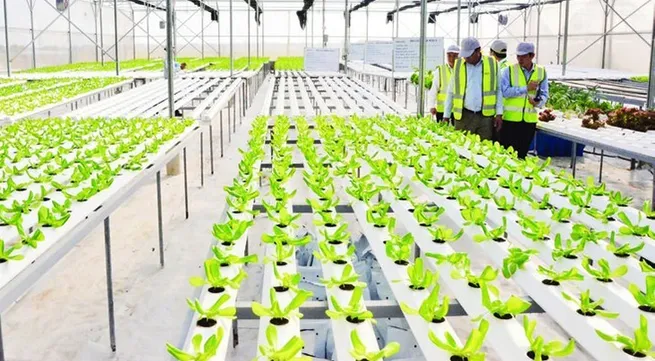Reforming human resource training in agricultural sector

Of which, the Ministry of Agriculture and Rural Development has four universities and 28 colleges.
However, the training of human resources for the agricultural sector still reveals a number of limitations such as: The percentage of trained workers with degrees and certificates from primary level or higher is still low, less than 5%; the percentage of pupils and students registered in the fields of agriculture, forestry, irrigation and fisheries decreased by more than 30% compared to the 2011-2015 period.
In recent times, with different funding sources, training institutions have invested and upgraded their facilities and equipment for teaching and learning; renovating the recruitment, attraction, fostering and development of lecturers and teachers; reviewing, updating and developing their training programmes. As a result, the quality of training and retraining has gradually improved.
The above-mentioned efforts have made an important contribution to increasing the percentage of trained workers.
However, besides these achievements, the training of human resources for the agricultural sector also revealed a number of limitations such as: The percentage of workers with degrees and certificates from elementary level or higher trained in the field of agriculture. training still accounting for a low rate, less than 5%; the percentage of pupils and students registered in the fields of agriculture, forestry, irrigation and fisheries decreased by more than 30% compared to the 2011-2015 period.
In 2022, this rate accounted for less than 2% of the total number of about 520,000 students enrolled nationwide and tended to continue to decrease; of which, there are a number of traditional agriculture, forestry and fishery industries, such as: soil science, agricultural extension, fishery exploitation, management and exploitation of marine and island resources; silviculture, forest resource management, with few or even no registered students.
The reason for the above situation is that the income of workers in the agriculture, forestry and fishery industries is still low, only about 50% of that of industry, construction and services.
The process of urbanisation and industrialisation has influenced the psychology of promoting non-agricultural industries to have better conditions for employment in urban areas and places with better working conditions.
The income of labourers in agriculture, forestry and fishery is still low, only about 50% of that of industry, construction and services.
In addition, some schools still have not been active in enrollment, and have not actively innovated their administration, content and teaching methods to meet the requirements of learners and the labour market.
Socialisation and mobilisation of social resources for training are still limited.
Although the coordination and connection between training institutions and businesses has achieved initial results, there is no coherent system and long-term orientation.
In order to realise the goal of industrialisation and modernisation of the agricultural sector and rural development, towards ecological agriculture, modern rural areas, civilized farmers, urgent tasks is to reform and improve the efficiency of training high-quality human resources to meet the requirements of the agricultural and rural development industry, including activities to promote cooperation between universities and enterprises and corporations in training and scientific research activities.
Accordingly, it is necessary to connect labour recruitment needs between enterprises and training institutions, especially high-quality agricultural human resources; support and encourage students to register for agricultural studies, especially industries that are difficult to enroll in; improve the quality of training and research, commercialize scientific and technological products; raise society's awareness of learning opportunities, job opportunities, and create more start-up opportunities in the agricultural sector.
It is necessary to reform human resource training under the companionship of businesses; take students out of the lecture hall, to the farms, workshops and factories of enterprises not only to visit and feel the life and economic activity but also to learn and put knowledge into practice.
Businesses also need to prioritise this type of training, seeing it as a responsibility to future generations.





